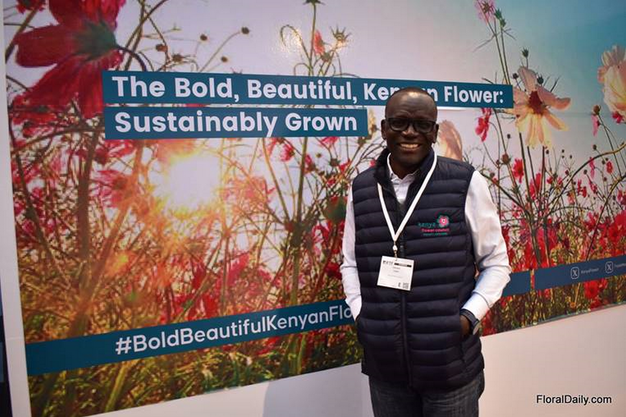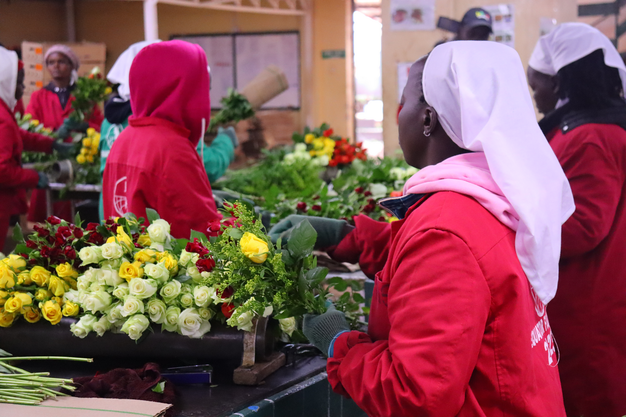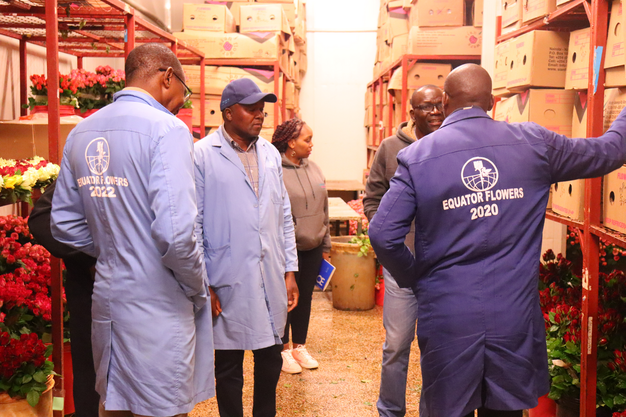On April 11, the UK government announced that it has temporarily removed export tariffs for cut flowers. Now, unlimited quantities of cut-flowers can be exported to the UK without tariffs. Exporting flowers to the UK via transit countries is also tariff-free. This move aims to facilitate trade with the UK while strengthen the UK- East Africa trade relationship. Indeed, the Kenyan Flower Council, which promotes the interest of the Kenyan floriculture industry, was delighted with the news: "This decision comes as a significant relief and a positive development for the floriculture industry in Kenya. Kenya Flower Council (KFC) extends its sincere appreciation to the UK government for this crucial decision, which will undoubtedly bolster our export activities and support the growth of our industry. By suspending these tariffs, the UK has demonstrated its commitment to fostering trade relations and supporting businesses, particularly during these challenging times," says Clement Tulezi, CEO of the Kenya Flower Council.

Clement Tulezi, CEO of the Kenya Flower Council at the IFTF 2023 in Vijfhuizen, the Netherlands
The Kenya Flower Council was established in 1966 by Kenyan growers and exporters of cut-flowers. According to the Council, the Kenyan floriculture sector contributes to 1.8% of the GDP bringing in KES 1b annually. "The suspension of the tariff will help us grow these numbers in the sector which has the potential to register a compound annual growth rate of 5.1% according to the Floriculture in Kenya Industry Size & Share Analysis - Growth Trends & Forecasts (2024 - 2029)*," Tulezi states.
On April 16, we interviewed Tulezi, and asked him to share his perspective on the tariff suspension and its implications for the Kenyan floriculture industry.
What is the main benefit of the UK's decision to suspend the 8% tariff on cut-flowers?
Tulezi: "The removal of tariffs is crucial for Kenyan flower exporters as it enhances their competitiveness at the UK market. This decision has the potential to result in a surge in market share and revenue for Kenyan flower producers. As tariffs are eliminated, Kenyan exporters can now offer their products at more competitive prices, which could lead to an increase in demand from UK consumers. This will translate into increased revenue for Kenyan flower producers and potentially open up new business opportunities for them in the UK market.
As we know, trade is an engine of job creation. KFC foresees increased investments in the sector, which will result in job creation and overall economic growth. The floriculture sector in Kenya has been growing steadily since the late 1980s, currently employing 200,000 workers mainly from the rural setup, and an additional 1 million workers in the supply chain, thereby supporting over 4 million livelihoods. By supporting this sector, the government can contribute to the development of the sector and related industries in the country, which will have a ripple effect on the entire economy."
What does this in practice mean for Kenyan growers and consumers?
Tulezi: "When export goods, and in our case, cut flowers, face tariffs, businesses must absorb the rising costs either by reducing their spending on labor, reducing future investments and expansions, or passing the costs on to consumers through price increases, each of which slows down economic growth. Retailers similarly absorb the tariffs, increasing the prices of these goods to their customers. For the Kenyan growers, removing tariffs will reduce their selling costs, thereby enhancing the affordability of their products for UK customers. This, in turn, will help to increase demand for Kenyan flowers in the UK market bringing in more returns and enabling the growers to plough back into their businesses.
It is also good to note that, the market for flowers is influenced by various factors such as consumer preferences, demand fluctuations, economic conditions, and competition. Implementing value-added strategies such as branding, product differentiation, and certification for sustainably and ethically produced flowers can enhance the marketability of Kenyan flowers."

How does the tariff suspension affect the UK-Kenyan trade relationship?
Tulezi: "The UK and Kenya have over a century of trade relationships. The UK has remained a significant export destination for Kenyan products, including cut flowers. This recent development will have far-reaching implications for the country's export sector including increased export volumes and revenue for Kenyan producers. Currently, most Kenyan flowers sold in the UK go through the auction market in the Netherlands. Nonetheless, the geographical proximity of Kenya to the UK, presents a logistical advantage for direct exports. Therefore, the decision allows Kenya to strengthen her position in the UK market.
The suspension of the 8% tariff has strengthened our economic relationship with the UK. It is a promising stride towards expanding the scope of trade and deepening commercial ties, thus showcasing a strong commitment towards mutual growth and development. Overall, this move symbolizes a positive gesture towards trade liberalization and collaboration, which will result in more trade agreements and partnerships between the UK and Kenya in the future. The decision is a welcome step towards strengthening the economic ties between the two countries, facilitating cross-border trade, and promoting mutual growth and prosperity.
We also hope that this thriving partnership between the governments of Kenya and the UK can further strengthen other initiatives, including trade promotion programs, financial incentives, and policy frameworks that support the floriculture sector. This could include organizing trade missions, export promotion programs, and providing regulatory assistance to facilitate market growth."
Do you think many growers will shift from European market to the UK market due to the stricter European requirements for the import of Kenyan flowers?
Tulezi: "As KFC, we recognize that the suspension of tariffs on cut flowers from Kenya to the UK provides an opportunity for growers to re-evaluate their market strategies. It is possible that some growers will switch markets from Europe to the UK, particularly in cognizance of EU regulations which include sanitary and phytosanitary standards and environmental sustainability, which can pose a challenge to Kenyan exporters when it comes to ensuring compliance and certification.
However, many Kenyan growers have long-standing relationships with European buyers, and the EU remains a critical market for Kenyan flowers. Moreover, the EU market has significant potential for premium pricing and brand positioning, particularly when it comes to sustainably produced flowers that meet the preferences of European consumers.
Ultimately, the decision to move markets from Europe to the UK will be influenced by a variety of factors, including the considerations of individual growers, market dynamics, logistical feasibility, and long-term strategic goals. We at KFC remain committed to supporting our members as they explore market opportunities, navigate regulatory requirements, and improve competitiveness in the UK and EU. We will continue to provide guidance, and advocacy, and share information to help growers make informed choices."
Why should UK importers choose Kenyan flowers?
Tulezi: "Kenya's strategic location with altitude on the equator gives the country a unique advantage in flower production. The consistent temperature and ample sunlight throughout the year create the perfect growing conditions for a diverse range of flowers. The favorable climate and optimal growing conditions in regions like Naivasha, central Kenya, and the north contribute to the superior quality of Kenyan flowers. As a result, Kenya has become a leading producer and exporter of high-quality cut flowers and ornamentals, including roses, carnations, and a basket full of summer flowers, to various destinations across the world.
UK importers have several compelling reasons to choose Kenyan flowers. Kenyan flowers are renowned for their exceptional quality, vibrant colors, and long vase life. We offer a diverse range of flower varieties, allowing UK importers, retailers, florists, and other flower vendors to cater to diverse consumer preferences and seasonal demands, providing flexibility in product offerings. Many Kenyan flower farms adhere to sustainable social and environmentally friendly practices, including the health and safety of workers, structured wage payment, water management, integrated pest management, renewable energy usage, and sustainable logistics among others. The KFC Flowers and Ornamentals Sustainability Standard (KFC FOSS) promotes all aspects of sustainability of Kenya's flowers, making our flowers accepted in the international market. Our standard assures UK importers and consumers regarding the ethical and responsible production of Kenyan flowers.
Additionally, Kenya has a well-established floriculture industry with decades of experience in flower production and export. This reliability, coupled with efficient logistics and supply chain management, ensures consistent availability and timely delivery of flowers to UK importers throughout the year.
Currently, Kenya holds a 17.1% market share of cut flowers sold in the UK, competing with other flower-exporting countries such as Colombia, Ecuador, Ethiopia, and the Netherlands. This gives us room for more growth in the market share. Monitoring market conditions and adapting strategies accordingly is necessary to maintain our competitiveness in the UK market."

What do you expect for the future of Kenyan flower exports to the UK?
Tulezi: "The future for Kenyan flower exports to the UK is likely to be influenced by various factors, including market dynamics, regulatory changes, consumer preferences, and global economic conditions. Kenya's reputation for producing high-quality flowers and its strategic geographical location for export will support our growth trajectory.
As the duty suspension on Kenyan flower exports to the UK is set to end in 2026, negotiations between Kenya and the UK regarding future trade arrangements will be crucial. Both parties will seek to negotiate a new trade agreement that maintains favorable terms for Kenyan flower exports, ensuring continued market access and tariff preferences. Collaboration between government agencies, industry associations, and private sector actors remains key in navigating future challenges and seizing opportunities for growth and sustainability in the global flower market.
Investments in technology, research and development, and sustainable farming practices will be essential for enhancing productivity, reducing environmental impact, and meeting evolving consumer preferences. Building resilience in the flower supply chain will be critical, particularly in light of disruptions caused by events such as the COVID-19 pandemic and international wars like the Red Sea attacks. Kenyan exporters are presently investing in diversifying transportation routes, strengthening logistics infrastructure, and implementing contingency plans to mitigate risks and ensure uninterrupted supply to export markets."
What's your perspectives on trade tariffs in general?
Tulezi: "Over time, the significance of tariffs in global trade has witnessed a decline thanks to the efforts by international organizations dedicated to enhancing free trade, such as the World Trade Organization (WTO). We truly hope that the UK's decision to suspend tariffs on cut flowers will remain in the long run, reduce trade uncertainty, and serve as a positive example for other countries to consider adopting similar measures.
Free trade has been found to have several positive impacts on consumers. One of the most significant benefits is the increased availability of a wider range of products and services. Additionally, free trade has the potential to lower prices, ultimately making goods more accessible and affordable to consumers.
While there may be occasional challenges and evolving market dynamics, I am confident that the Kenyan floriculture industry will continue to thrive and grow by embracing sustainability, expanding its market share, and fostering partnerships. This will ensure that UK consumers can continue to enjoy the beauty of Kenyan flowers while contributing to the economic prosperity of both nations."
*Source: https://www.mordorintelligence.com/industry-reports/kenya-floriculture-market
For more information:
Kenya Flower Council
[email protected]
kenyaflowercouncil.org
